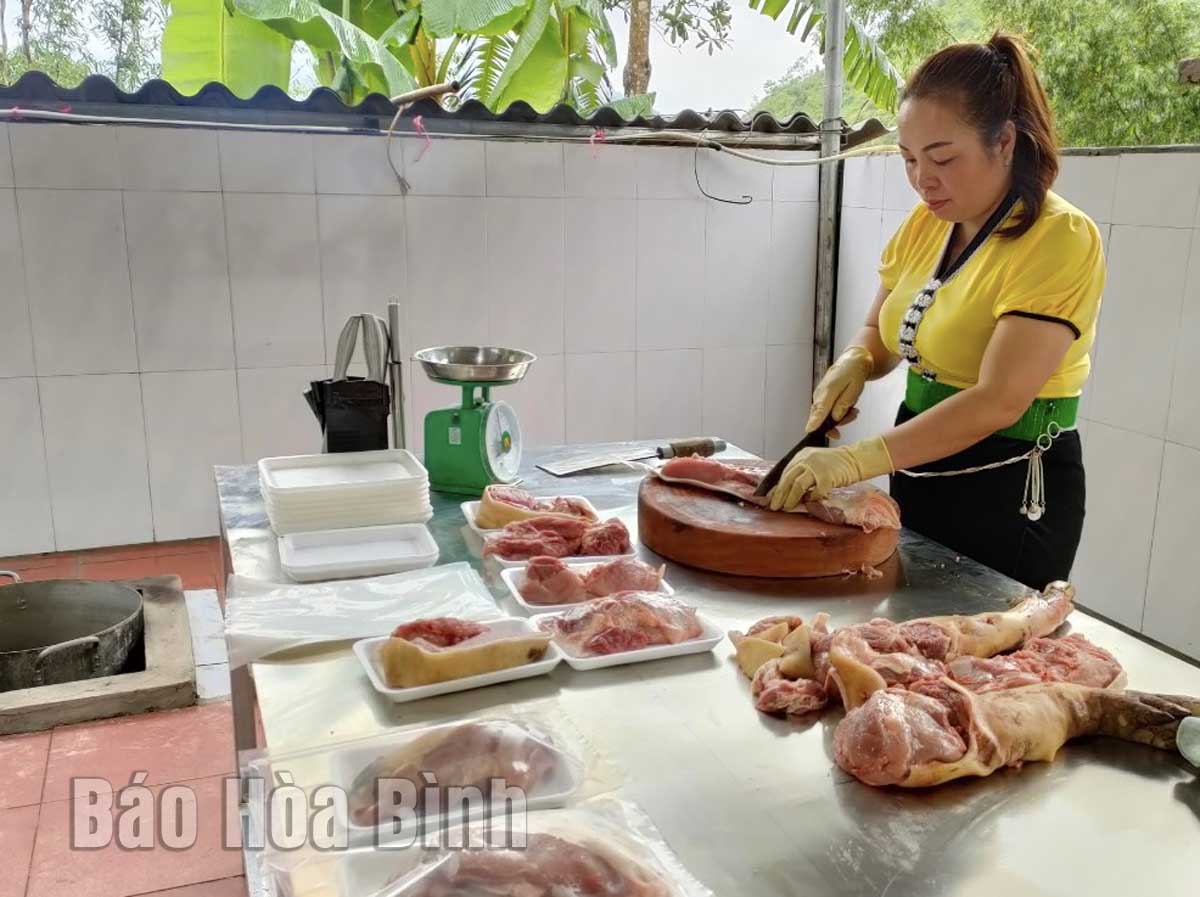
(HBO) – Tan Minh pork produced by Tam Cuong Tan Minh cooperative has been classified as a three-star product by Da Bac district’s OCOP (One Commune, One Product) assessment council. Currently, the cooperative is working to complete dossiers and improve product quality to prepare for the upcoming OCOP product classification at the provincial level in 2022.
Tan Minh
indigenous pork products by Tam Cuong Tan Minh cooperative in Da Bac district’s
Tan Minh commune are vacuum sealed to ensure food safety.
Tan Minh commune is home to many ethnic minority groups, including Tay, Muong
and Dao, with a unique culinary culture. The locality’s indigenous pork is used
in many dishes that are popular to local residents and tourists.
Ha Thi Tam, a local resident in Enh hamlet who has 17-year experience in
catering service, said that Tan Minh pork has special delicious taste.
Recognising the high demand for the product, her family has expanded the
selling channels to social networks like Zalo and Facebook, while forming the
Tam Cuong Tan Minh cooperative in August 2022 with 17 members to develop the
product.
Tam, who is also chairwoman and director of the cooperative, said that what
make Tan Minh pork different is the breeding technique of pigs and the precious
genetic source of local pigs. Tan Minh pigs are raised in almost a year. Their
main food is bananas mixed with corn, and cooked cassava. Therefore, native
pork has a fragrant, greasy but not fatty taste due to its characteristic fat.
Currently, the cooperative is raising 200 pigs. It has also coordinated with
local farmers to ensure the supply of the product.
In order to meet requirements of the OCOP programme, the cooperative has
invested in a spacious slaughterhouse system with preservation equipment and
vacuum machines to ensure that pork is always fresh, while ensuring the
traceability of the product. On average, each month, the cooperative sells
about 500kgs of pork at a retail price of 150,000 VND per kilo.
According to Tam, the cooperative is seeking the provincial OCOP status for the
product, which is expected to help expand its market and sales. The cooperative
hopes to foster collaboration with other black-skin pig raising cooperatives in
the province to form a production chain, ensuring the supply of the product to
all cities and provinces across the country, Tam added./.
Hoa Binh province is undergoing a dynamic transformation amid Vietnam’s national digital transition. Building on Poliburo’s Resolution No. 57-NQ/TW on breakthroughs in science, technology, innovation, and national digital transformation, the province has rolled out a wide range of practical action plans. A standout initiative is the "Digital Literacy for All” movement, an effort to ensure that no one is left behind in the digital era.
Hoa Binh province is undergoing a dynamic transformation in the wake of the national digital transformation movement. Building on Resolution No. 57-NQ/TW of the Politburo on breakthroughs in science, technology, innovation, and national digital transformation, the province has implemented a wide range of practical action plans. A standout initiative is the "Digital Literacy for All” movement ambitious effort to ensure that no one is left behind in the digital age.
With a spirit of unity and proactive problem-solving, the Party Committee, the government and the people of Dong Lai Commune (Tan Lac District) have made great strides in implementing the resolutions of the 24th Party Congress of the commune for the 2020 - 2025 term. Focusing on leadership and practical actions, the commune has brought the Party’s resolutions into daily life, creating strong impacts and pushing the local development forward.
Amid the nationwide push for digital transformation, young people in Hoa Binh Province are stepping up as dynamic pioneers, applying technology to enhance Youth Union operations and expand the reach of youth-led initiatives. Through creativity and adaptability, Youth Union organizations at all levels have introduced a series of practical solutions, contributing to modern governance and community development.
In recent years, An Nghia commune, located in Lac Son district, has stepped up administrative reform, focusing on improving the quality and efficiency of its single-window service unit for receiving and processing administrative procedures. These improvements have helped create favourable conditions for local residents and organisations to handle administrative procedures, contributing to the commune’s broader socio-economic development.
The Prime Minister-approved master plan to develop the multi-use value of forests ecosystems through 2030, with a vision to 2050, aims to improve the management and sustainable use of forest resources, create jobs, increase incomes, and improve the living standards of ethnic minorities, people in mountainous and remote areas, forest workers and those living near forests.



